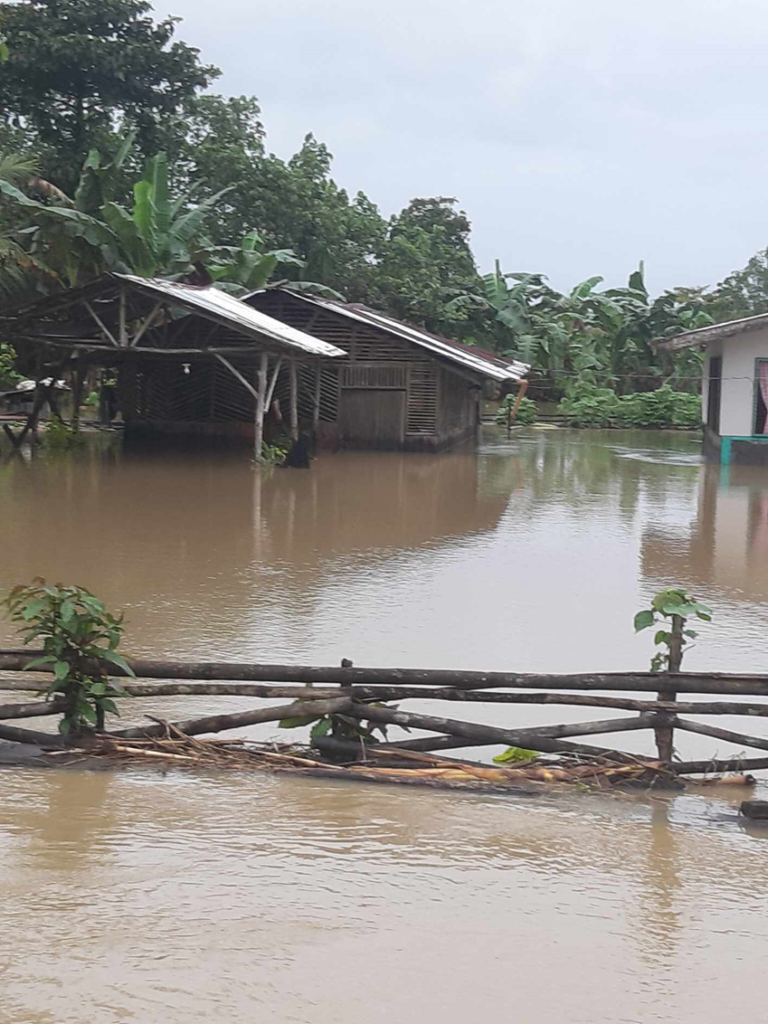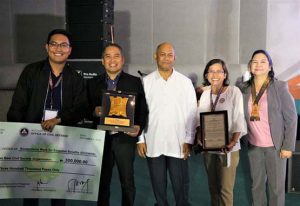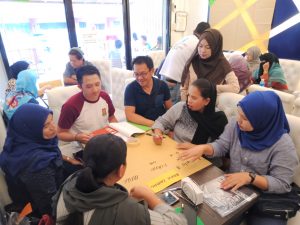
Loreto community members demonstrating sustainable farming practices.
“This really helps with our daily lives and livelihoods. Our livelihoods are mostly farming, fishing, and gardening. We also have livestock,” states Nena Ompad, encapsulating the ethos of a gathering that unfolded amidst the tranquil landscapes of Poblacion, Loreto, Agusan del Sur, on March 15, 2024.
As the sun cast its rays over the proceedings, the participants, predominantly women and IPs, eagerly awaited the day’s activities. Facilitated by Rena Davis and Theresa Fe Oliver Abesamis of IP Resilience Project team of ECOWEB, the activity aimed to re-echo the importance of Diversified and Integrated Farming System (DIFS) and Natural Farm Inputs Concoction Making. These subjects are not just mere strategies but essential components for promoting community resilience and sustainable agriculture. They epitomize the vital principles of ECOWEB’s IP Resilience project, one of the current initiatives of ECOWEB benefiting indigenous communities, in partnership with Help – Hilfe zur Selbsthilfe of Germany.
The organizers’ opening message deeply resonated with the participants, mostly farmers and community members from Barangays all across Loreto, as they highlighted the importance of re-echoing and reviewing the essential concepts of sustainable agricultural practices, a sentiment echoed by Nena Ompad, who stood as a notable figure among the participants, exemplifying the leadership and resilience of women and IPs in farming communities.
The venue was abuzz with enthusiasm as inquiring minds shared their ideas as to why they need to re-echo the principles they have already learned, ranging from an aim for a better productivity, knowledge retention, and the guarantee of safe, organic produce for both consumers and their families.
The conversation happened organically, the community members enthusiastically engaged in dialogues about concoctions, their importance and their diverse benefits, serving as pest control and organic fertilizers. One of the participants brought to mind their training in Kinuskusan, Bansalan and enlightened the other participants with the importance of diversification in farming as well as the promotion of a departure from monocropping and a push towards a holistic approach to agriculture.

Community member Nena Ompad a community member discussing the concept of SALT (Sloping Agricultural Land Technology)
SALT (Sloping Agricultural Land Technology) soon became the focus of the discussion, and the participants examined the complexities of choosing the right crops suitable for Loreto’s topography. Lively dialogues followed as the participants shared their experiences and methods for increasing yields while protecting their environment using holistic and sustainable agricultural practices.
“Not only do we have long-term crops but we have short term ones as well that can really help us… And we can also minimize our expenses especially considering that everything is very expensive because of the inflation we are currently experiencing,” shared a participant, emphasizing the versatility and economic viability of diversified farming systems.

One of the FAITH gardens set up by Loreto farmers before it was inundated by the flood.
The discussion then transitioned to the subject of FAITH (Food Always In The Home) gardening, a prime example of sustainable agriculture and community food self-sufficiency method. A FAITH garden promised not only a sustainable source of food for the family but also a sense of empowerment as participants explored innovative cultivation methods, from traditional planting techniques to ingenious adaptations like sack gardening.
The community members have already started working on a FAITH garden when flooding caused by shearline and LPA trough inundated the region and destroyed most of their crops.

A FAITH garden completely covered by floodwater.
“We already had so many crops and vegetables that were almost ready to harvest, but now we are back to zero… Our expenses and efforts were all for nothing, the majority of our crops were destroyed and many of our livestock died,” lamented one farmer, recalling the profound impact of the calamity on their livelihoods.
Despite some major setbacks brought about by the recent LPA trough in January and February, the community members were grateful for ECOWEB’s unwavering support and assistance that have allowed them to gradually recover and restart their projects.
The community members then shared their actions towards disaster preparedness and crop protection. They have already begun implementing ideas such as raised beds, sack gardening, and applying the principles of SALT (Sloping Agricultural Land Technology). These methods, adapted to the local environment and resources, not only optimize space usage but also offers protection for crops against possible flood damage.
The day’s discussion on DIFS and organic concoctions embody the principles of climate-smart agriculture practices. These techniques allow the Loreto farmers to easily adapt to increasingly irregular and extreme weather conditions, particularly floods which the community is most susceptible to. By applying the principles of SALT into their farming practices, the community members would be able to carefully select crops and plants suitable for Loreto’s topography and minimize erosion while also increasing soil water retention during heavy rains. This technique prevents soil degradation while at the same time boosts soil resilience against flooding, in doing so protecting the crops even in the most unfavorable conditions.
FAITH gardens, similarly, are an effective climate-smart agricultural practice that can be done even by those with minimal agricultural knowledge. These gardens emphasize the importance of planting diverse and resilient crops, allowing farmers to not depend on monocropping and providing a vital source in case of natural disasters and erratic weather. FAITH gardens are often designed to suit the surrounding environment and to optimize space, often using raised beds and sack gardening, making them ideal for even those who do not have the space for raising crops and also allow efficient drainage and reduce damage during floods.
Using organic products are also an effective climate-smart strategy. Conventional chemical fertilizers often contain harmful products that damage the soil, cause erosion, and decrease nutrients. By utilizing organic products that do not contain dangerous synthetic chemicals, farmers can ensure they are enriching the soil without damaging the environment as well as make sure that crops do not contain harmful chemicals that could harm the health of consumers.
Practical demonstrations on planting techniques, like marcotting and grafting, enriched the participants’ learning experience, sparking their enthusiasm for experimenting with fresh approaches to farming.
They also delved into advanced topics such as Oriental Herbal Nutrients (OHN) and Indigenous Microorganisms (IMO), illuminating participants on the intricate relationship between soil health and plant nutrition. As the day unfolded, a sense of camaraderie was felt, forging bonds of solidarity and mutual support among the participants, who recognized the strength derived from collective knowledge and shared aspirations.
Preparation of natural concoctions took center stage in the afternoon session, echoing the principles of organic farming and sustainability. Guided by experienced facilitators from ECOWEB, participants eagerly immersed themselves in hands-on training, learning to create Fermented Plant Juice (FPJ) and Fermented Fruit Juice (FFJ) using locally available materials. There was a palpable excitement as the participants went outside, eager to get their hands dirty and start practically applying all the lessons they have learned.

Chopping up fruit and materials to create organic concoctions
Each of the community members all had a go at helping create the concoctions. Whether they were chopping up plant materials and fruits, measuring cups of molasses to add to the formula, or washing up dirty containers, every single person was excited to help out and participate in a collective activity that would benefit everyone.

Concoctions created by the participants.
“We can use these (FPJ and FFJ) on our crops and plants so that we don’t have to purchase chemical fertilizers that are very expensive… Sometimes it feels like we only look at our crops and don’t even earn from them,” expressed one community member, contemplating on the financial burden imposed by conventional farming practices, a sentiment echoed by many women farmers who bear the brunt of agricultural labor.
“Instead of spending ₱3000, maybe we can just spend around ₱1500 since we can use these organic fertilizers. And we can also avoid getting sick since they aren’t made from dangerous synthetic chemicals,” added another participant, highlighting the potential cost savings and health benefits associated with organic farming methods, particularly relevant given the focus on women’s health and well-being during Women’s Month.
They emphasized the detrimental effects of synthetic fertilizers and chemicals on the soil, echoing concerns about soil degradation and erosion worsened by conventional farming practices. Recognizing the need for environmentally-friendly and sustainable alternatives, they expressed a collective commitment to transitioning towards organic farming methods. With the knowledge acquired from ECOWEB’s training on concoction making, the participants aim to replace harmful chemicals with organic concoctions, and in doing so reducing their reliance on expensive and harmful substances.
The participants’ eagerness to integrate these natural fertilizers into their farming practices, heralds a paradigm shift towards ecologically sound and economically viable agriculture. They have also started looking towards the future and have started pondering ideas on how they can further benefit from these organic products.
“We are hoping that we can advertise and sell these and our products, not just use them, so we can add more to our income,” expressed a community member, highlighting the economic potential seen in sustainable farming practices.
The whole event turned out to have transcended way beyond its function as a simple re-echoing of lessons learned; it served as a catalyst for community empowerment and agricultural revitalization. As farmers embraced innovative yet accessible techniques, they embodied the resilience and adaptability essential for thriving in various agricultural landscapes.
ECOWEB’s commitment to supporting these projects and fostering sustainability and community development tirelessly holds firm. Through initiatives, support, and collaboration with partners like Help Germany, ECOWEB makes sure that these efforts are not just isolated events but part of a bigger movement towards community resilience and sustainability.

Later on, each participant received black pepper plants for planting and propagation as part of the training provided to IP farmers, including those from Loreto in Mindanao Baptist Rural Life Center (MBRLC) Foundation. As the black pepper plants were distributed among the participants, discussions arose regarding their culinary and medicinal uses, fostering a deeper appreciation for the gifts of nature. Cultivating black pepper aligns with agro-forestry practices aimed at forest conservation, integral to the sustainable development and protection plan within ancestral domains. Given that boat transport along the river system serves as the primary means of marketing farm products from hinterland IP communities, black pepper emerges as a suitable cash crop for cultivation in these areas.
As the community members and ECOWEB facilitators said their goodbyes, under the golden rays of the afternoon sun and the promise of a new agricultural dawn, a re-echoing of traditional wisdom intertwined with modern sustainable techniques signaled a promising future for sustainable agriculture and community self-sufficiency. With newfound knowledge and fortified resolve, the people of Loreto stand poised to cultivate not just crops but also a resilient and prosperous community, rooted in the timeless wisdom of the land.



